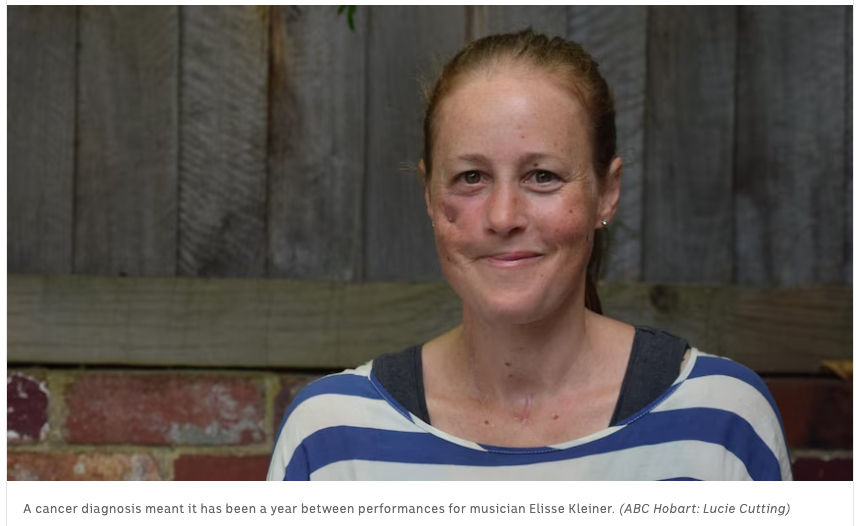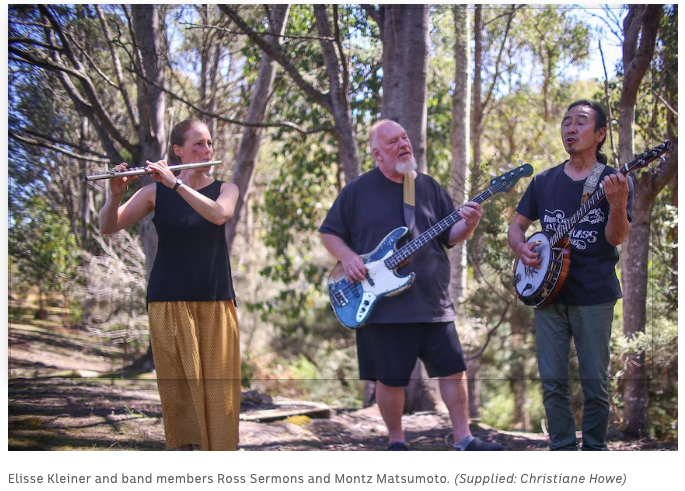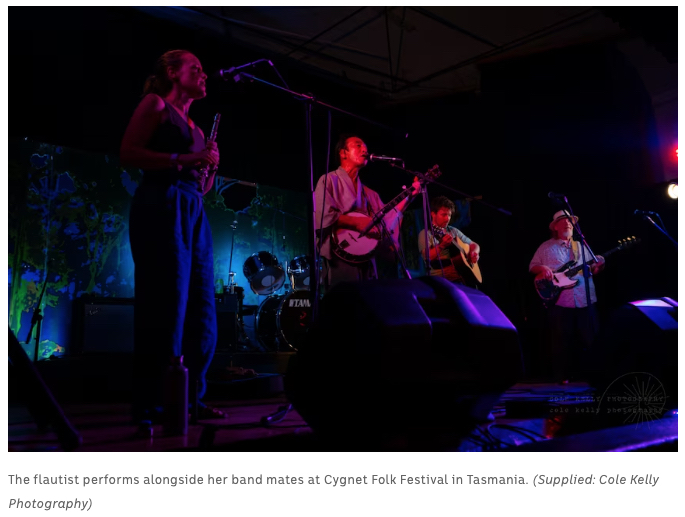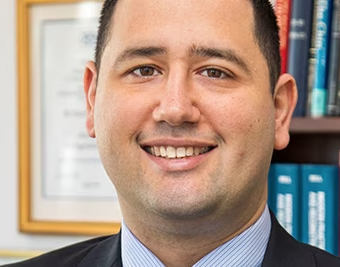Dr. Adrian DeAngelis fights to return musician Elisse Kleiner to the stage

Elisse Kleiner's dentist trip led to a salivary gland cancer diagnosis and surgery to remove half her top jaw

ABC Radio Hobart / By Lucie Cutting
Musician Elisse Kleiner's return to the stage felt like a homecoming she wasn't sure she'd achieve.
Just a year ago, the flutist had half her top jaw removed after she was diagnosed with cancer of the salivary glands.
Ms Kleiner was unsure if she would be able to continue to perform the flute because of muscle differences following surgery, but advances in surgical planning enabled a smoother return to the stage.
Now an advocate for those diagnosed with head and neck cancer, Ms Kleiner said she hoped to see greater support for patients, who she said experienced "a bit of a cliff face" in continuity of support.

Strange sensation leads to the diagnosis
It felt like a wobbly tooth, but the strange sensation that took Ms Kleiner to the dentist marked the start of a cancer journey for the Tasmanian musician.
The musician was referred on for surgery to address what was thought to be a lesser issue after a "hole" was discovered during a scan by Ms Kleiner's dentist.
Following oral surgery, preliminary pathology results from samples sent for testing presented a terrifying prospect.
"[The surgeon said] it could be anything from a lab error to 'you've got oral cancer, you'll have to have half your jaw cut out,'" Ms Kleiner said.
She was diagnosed with mucoepidermoid carcinoma, a cancer of the salivary glands.
Surgery to remove the cancer can involve cuts to the lip, around the nose and sometimes under the eyelid. It can be difficult to preserve the impacted area once operated upon.

Health was a priority for Ms Kleiner, as was her decades-long career as a flutist.
From day one, I was telling them all I was a flute player," she said.[The flute], it's always been my voice.It's the way I've expressed myself ever since high school.
Faster recovery with surgical advances
Individual circumstances do not dictate surgery pathways but can inform decisions, said Adrian DeAngelis, an oral and maxillofacial surgeon at the Royal Melbourne Hospital.
Dr DeAngelis operated on Ms Kleiner.
He said her return to the stage could partly be attributed to advances in surgical planning that he learned of during a visit to the United Kingdom last year, which were now used by the Royal Melbourne Hospital.

Called virtual surgical planning, the process reduces surgery time and means the patient is able to regain movements, such as chewing, much earlier than could previously be achieved.
Using patient dental moulds, three dimensional models and clinical photos, specialists are now able to digitally design an oral and maxillofacial surgery and reconstruction.
Cutting guides and custom 3D metal plates created as part of the process reduce surgery time and allow for more accurate and natural-looking restorations.
Reduced surgery time also means less complications associated with long surgeries.
Of Ms Kleiner's return to the stage, Dr DeAngelis said it also came down to perseverance.
"Some people in the face of adversity, it becomes a roadblock for them," Dr DeAngelis said.
"Elisse has maintained a very positive attitude throughout and a very can-do attitude and, well, here she is."
Painful, but happy
Appearing at the same Tasmanian folk festival where she last stepped onto the stage, Ms Kleiner said the performance felt like a return to her old self.
A continued connection to her music community buoyed her to the stage and to battle through the pain to stay there.
"Even in moments where it was quite frustrating for me to find my sound and maintain it, I could just look over and there was a little smile from one of the band members and it encouraged me to keep going," she said.
"My heart was singing, but my body was screaming.
"I had a lot of pain because I hadn't been playing at that volume for a year."
Due to muscle differences, Ms Kleiner now has to breathe more heavily to perform. She said she was dizzy by the end of the performances, but elated.
"Afterwards I burst into tears, I had a big moment … because I started to feel like me again," she said.
No early detection screening methods
Ms Kleiner is now an advocate for Head and Neck Cancer Australia, a national charity dedicated to providing education and support for sufferers.
She hopes greater emphasis can be placed on post-surgery care, saying that many in the head-and-neck-cancer community feel a greater depth of support is needed following surgery.
In the past decade, the diagnosis of head and neck cancer has increased by 34 percent, according to Head and Neck Cancer Australia.
In 30 years, there's been a 385 percent increase in tongue cancer in otherwise healthy young women.
There are no screening methods for early detection of the cancers, and 60 percent of cases are advanced by the time they are detected.
Ms. Kleiner found support to help her navigate through the huge change, including advice from a fellow patient on what changes to expect.
She hopes others will reach out to Head and Neck Cancer Australia if they feel alone.
"If there are people out there feeling isolated … reach out to something like the support group," she said.
"It's a good bunch of humans."